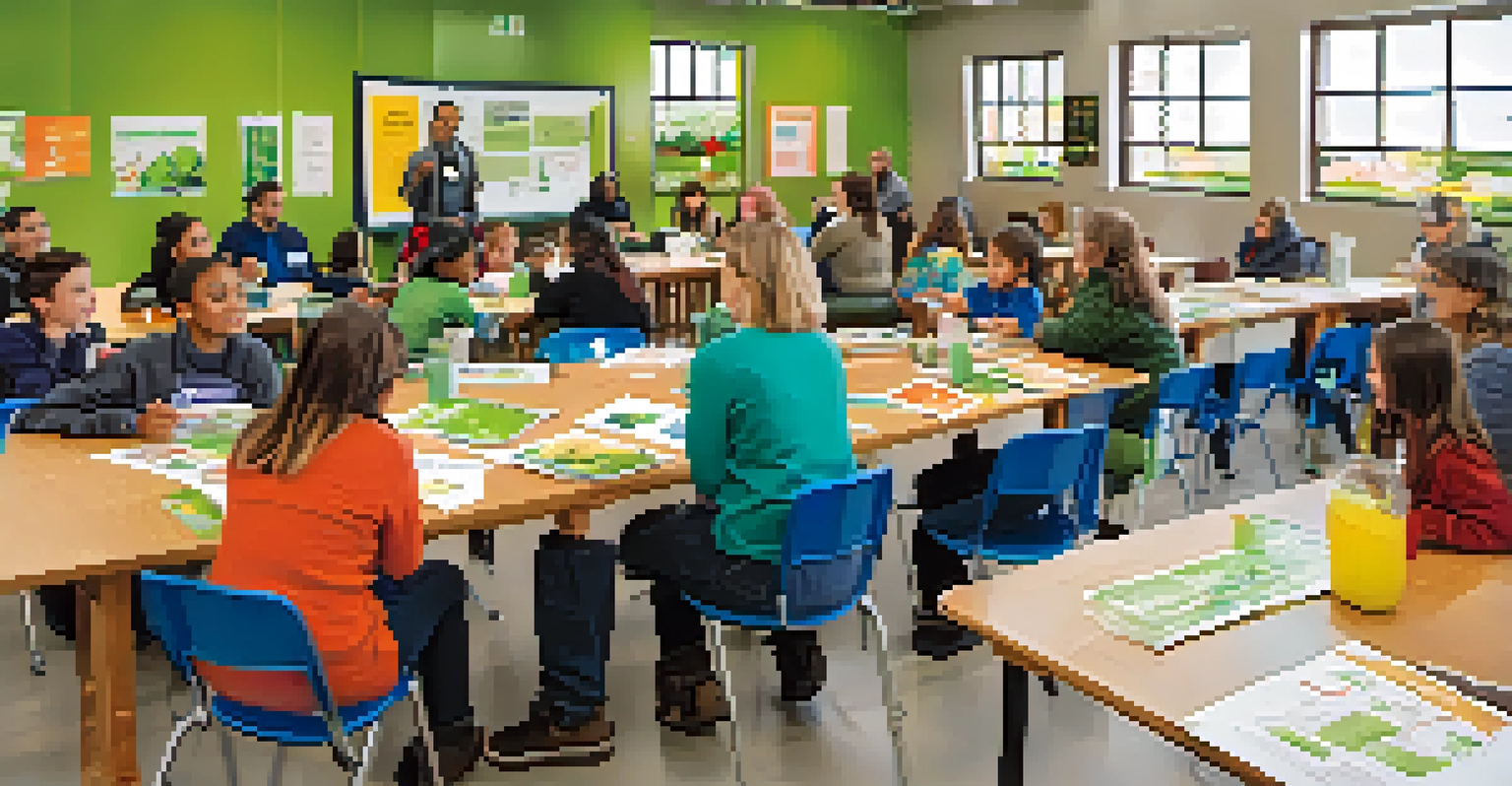Waste Reduction Strategies That Seattle Implements Effectively

Overview of Seattle's Waste Reduction Initiatives
Seattle has long been at the forefront of sustainable waste management. The city has implemented a variety of initiatives aimed at reducing waste and increasing recycling rates. These efforts align with Seattle's broader environmental goals and showcase the city's commitment to sustainability.
We do not inherit the earth from our ancestors, we borrow it from our children.
One of the key components of Seattle's waste reduction strategy is the emphasis on community involvement. Local residents and businesses are encouraged to participate in waste reduction programs, making it a collective effort. This community-centric approach not only enhances participation but also fosters a sense of shared responsibility.
By focusing on education and outreach, Seattle has successfully raised awareness about waste reduction. Programs targeting schools, businesses, and neighborhoods have been instrumental in informing the public about best practices for minimizing waste. This proactive stance sets a strong foundation for long-term sustainability.
Composting Programs to Divert Organic Waste
One standout initiative in Seattle's waste reduction strategy is its robust composting program. The city provides residents with easy access to compost bins, encouraging them to recycle organic waste like food scraps and yard debris. This initiative not only reduces landfill waste but also enriches the local soil.

Seattle's composting program has seen significant success, with tens of thousands of tons of organic materials diverted from landfills each year. This achievement not only helps reduce greenhouse gas emissions but also supports local agriculture by providing nutrient-rich compost. It's a win-win for both the environment and the community.
Community Engagement Drives Success
Seattle's waste reduction initiatives thrive on community involvement, empowering residents and businesses to participate actively in sustainability efforts.
Furthermore, educational campaigns surrounding composting help demystify the process. By showing residents how to compost effectively, Seattle empowers them to make sustainable choices in their daily lives. This grassroots approach reinforces the idea that small actions can lead to significant environmental impact.
Recycling Initiatives That Engage the Community
Recycling is another critical focus of Seattle's waste reduction strategies. The city has implemented user-friendly recycling programs that make it easy for residents to sort their recyclables. Clear guidelines and colorful bins help demystify the recycling process, ensuring that more materials are correctly recycled.
The greatest threat to our planet is the belief that someone else will save it.
To further enhance engagement, Seattle conducts regular community workshops and events focused on recycling education. These initiatives aim to inform residents about what can and cannot be recycled, effectively reducing contamination rates. By fostering a culture of recycling, Seattle encourages residents to take pride in their contributions to waste reduction.
Additionally, the city partners with local businesses to promote recycling efforts. Incentives for companies that adopt sustainable practices help create a unified front against waste. This collaboration exemplifies how community and business engagement can lead to more effective recycling outcomes.
Reducing Single-Use Plastics in Seattle
Seattle has established itself as a leader in the fight against single-use plastics. The city’s ban on plastic straws and utensils demonstrates its commitment to reducing plastic waste. This initiative not only lessens the amount of plastic entering landfills but also encourages businesses and consumers to seek sustainable alternatives.
By promoting reusable options, Seattle is paving the way for a cultural shift away from disposable products. Local businesses are adapting by offering incentives for customers who bring their own containers, creating a more sustainable shopping experience. This shift is not just beneficial for the environment; it also fosters a sense of community and shared purpose.
Innovative Composting and Recycling
The city's robust composting program and user-friendly recycling initiatives significantly divert waste from landfills and promote environmental responsibility.
Seattle's efforts are complemented by educational campaigns that highlight the environmental impact of single-use plastics. Residents are informed about the importance of reducing plastic consumption and are encouraged to make more sustainable choices. Together, these efforts make a significant difference in the fight against plastic pollution.
Innovative Waste-to-Energy Solutions
Seattle is also exploring innovative waste-to-energy solutions as part of its waste reduction strategy. By converting waste into energy, the city can reduce landfill waste while producing renewable energy. This approach not only helps manage waste but also contributes to the city’s energy needs in a sustainable way.
The waste-to-energy facility in Seattle is designed to process a significant amount of the city’s waste, transforming it into electricity. This process not only diverts waste from landfills but also reduces methane emissions, which are a potent greenhouse gas. It’s an example of how waste can be repurposed for the greater good.
Moreover, Seattle continues to invest in research and development to improve these technologies. By staying at the forefront of waste-to-energy innovations, the city aims to enhance the efficiency and sustainability of its waste management practices. This forward-thinking approach is essential for tackling the waste challenges of the future.
Community Engagement Through Education Programs
Education is a vital component of Seattle's waste reduction efforts. The city runs various programs aimed at educating residents about waste management practices, emphasizing the importance of reducing, reusing, and recycling. These programs are designed to empower individuals to take action in their own lives.
Seattle's educational outreach includes school programs, workshops, and online resources that provide valuable information on sustainable practices. By engaging students and families, the city fosters a culture of sustainability that extends beyond the classroom. This investment in education helps build a community that prioritizes environmental responsibility.
Collaboration for Sustainable Solutions
Partnerships between the city, local businesses, and organizations enhance the effectiveness of waste management strategies and foster a culture of sustainability.
Through these initiatives, Seattle not only informs its residents but also inspires them to be proactive in waste reduction. When people understand the impact of their choices, they are more likely to adopt sustainable habits. This grassroots movement is crucial for achieving long-term waste reduction goals.
Collaboration with Local Businesses and Organizations
Collaboration plays a crucial role in Seattle's waste reduction strategies. The city partners with local businesses, nonprofits, and community organizations to create a unified approach to waste management. These partnerships enhance resource sharing and amplify the impact of various initiatives.
By working together, Seattle and local organizations can implement programs that benefit both the community and the environment. For instance, businesses are encouraged to adopt sustainable practices, such as reducing packaging waste and implementing recycling programs. This collaboration not only makes waste reduction more effective but also promotes a sense of community ownership.

Moreover, these partnerships often lead to innovative solutions that can be scaled and replicated in other cities. Seattle’s collaborative approach serves as a model for how communities can come together to tackle waste challenges. It's a testament to the power of teamwork in achieving sustainability goals.